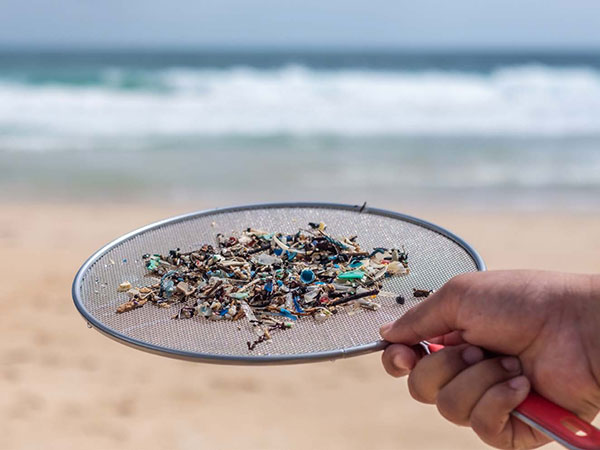
With Sister Mary Ann Garisto
The Creation’s Transformative Energy Committee (CTEC) of SCNY has committed to reducing plastics in our lives, and we invite you to do the same. We can begin by reflecting on how our habits contribute to what Pope Francis calls a “throwaway culture.”
“We cannot allow our seas and oceans to be littered by endless fields of floating plastic,” said Pope Francis. When Pope Francis spoke these words, he was referring to the three large islands of plastic rubbish and microplastics that have ended up in the Pacific Ocean. Food packaging accounts for more than 40% of this waste.
Many sea and land animals are suffering and dying because of microplastics. What are microplastics? They are frag-ments of plastic less than five millimeters in length that are difficult to recycle-reuse, and, as plastics of all sizes, do not readily break down. Like single-use plastic, less than 10% of microplastics are recycled, over 75% end up in landfills or oceans, and nearly 10% are incinerated. Microplastics are found in a variety of environments. Marine animals, fish and birds often ingest the plastics, resulting in neurological and reproductive toxicity, and work their way up through food chains. They have been detected in drinking water, food products, seafood, table salt, human tissues and organs, and human blood. Scientists are presently exploring the impact on microplastics on humans. They also have been found to be a source of air pollution.
Microplastics are also produced commercially in the form of microbeads, which are found in cosmetics, synthetic cloth-ing materials, plastic bags and plastic bottles. More information microplastics is available on the Wikipedia, Britannica or National Geographic websites.
Another way to reduce and eliminate use of plastic is by becoming an aware consumer.
The CTEC has sent out specific calls to action, recommending consumers to take the following steps:
- Take an inventory of the food you buy and its packaging. Consider asking the store manager if there are efforts to reduce use of plastic in food packaging.
- Learn how your municipality handles plastics in its recycling stream. Near the Mount, for example, tours are held at the Yonkers Material Recovery Facility (off the N.Y.S. Thruway near the Stew Leonard exit).
- The Beyond Plastics website, www.beyondplastics.org, provides a wealth of information on the topic. The national project, based at Bennington College in Vermont, pairs environmental policy experts with college students to build an anti-plastics movement. The site includes many studies, fact sheets, and reports.
And if you haven’t done so already, please consider replacing your water bottle with a stainless steel or glass bottle. According to Beyond Plastics, “one million single-use plastic bottles are bought around the world every minute and more than half-trillion plastic bottles are sold annually, but less than one-third of all plastic bottles will ever be recycled.”
Keep watching this space for more suggestions on how to lower your carbon footprint.
